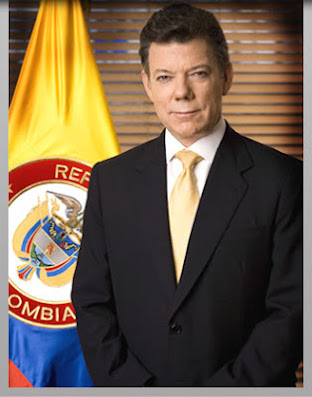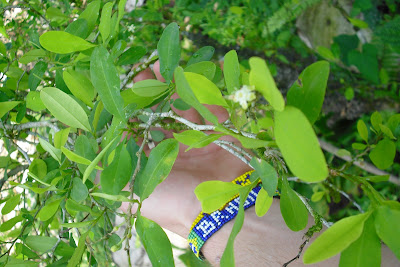We’re not
big fans of hyperbole here and, thankfully, most Colombians appear to be that
way too.
Hence the somewhat indifferent reaction from many locals to the
official revelation of what has been one of the worst-kept secrets in recent
Colombian politics: President Juan Manuel Santos’s government has had
preliminary discussions with the country’s long-standing left-wing guerrillas,
Farc.*
 |
| El Presidente: Can he really make peace with the Farc? |
It’s all down to reconciliation weariness really – Colombia has been here
before on many occasions. The fact that the Farc is still involved in bombings
and kidnappings tells you just how successful those previous attempts at
fostering peace went down.
So what, if
anything, has changed this time around? Well, of course, there’s a different
administration in place intent on ‘learning from the errors of the past’. It’s
the very least President Santos and his team could try. He certainly is saying
the right things in this regard.
He made it clear in his state broadcast that
the country’s military would remain in 'every centimetre of national territory'.
That was an obvious reference to the failed strategy of former President Andrés
Pastrana who, in 1999, demilitarised a vast zone in the south of the country to
facilitate peace talks with the rebels.
While negotiations did take place, this
buffer zone allowed the Farc to rebuild, recruit and reinforce itself in
relative comfort. The legacy of this is still being felt today as it is in this
area that the group remains at its strongest.
Now, while
Farc may still have strength in its unofficial safe zones, generally speaking
it would appear to be at the weakest point in its history.
It has suffered key
military setbacks against the state’s armed forces in the last few years with the recent upsurge in its attacks seen by some as the desperate last kicks of
a cornered beast. Sitting down with the government could be its best option right now. Time will tell how sincere the group is about the whole process.
 |
| 'The Path to Peace': Far from straightforward. |
From this remove, it would
appear that the government – and, by extension, the vast majority of the
country’s inhabitants – has far more to gain. Obviously, if Farc agrees to
lay down its weapons and cease attacks that’s good news for all who want peace.
For Santos, if things go that well so soon, it should do his faltering approval rating no end of good, helping him in his quest for re-election in 2014.
For Santos, if things go that well so soon, it should do his faltering approval rating no end of good, helping him in his quest for re-election in 2014.
Peace
negotiations have been part of his manifesto – quite apart from his
predecessor, the hard-line right-winger Álvaro Uribe who has been very
vociferous in his opposition to talking with ‘terrorists’, attacking the
current administration’s policy at every opportunity.
A military-defunct Farc is clearly the very least the Colombian government and the
majority of the country’s electorate will look for in any agreement.
In such a scenario, the Farc, in some form, would surely look for political legitimacy
and perhaps immunity from prosecution for some or all of its top members. This
is looking at it from a political-conflict point of view.
Yet, the
days of this struggle being purely about political ideology – if they ever were
– are long gone. There is a far more powerful agent at play and it is this that
is at the crux of the issue here: the control of the drugs trade.
For Farc to
go legit and allow unrestricted official access to its white-gold territories will be the equivalent of signing its own death warrant – mainstream
political presence or not.
While we might know what comes out of the depths of
Colombia’s jungles, what actually happens inside them and exactly where remains
about as mysterious as the inner workings of a rugby scrum. And for those
working in the illegal drugs trade, that’s the way they want it to remain.
 |
| The 'white gold' in its ore form, the coca leaf. |
It has been
mentioned on these pages before that the current strategy by most elected
governments, Colombia included, in tackling the narcotics underworld is not
working (see ‘Dealing with the Dealers’:
http://bit.ly/NXGLEl).
Calls for a new
front in this war, however, are gathering pace, not least in Latin America
(Santos himself has spoken of the need for a new approach), a land that knows more
about this issue than most.
Take the illegal drugs trade out of subversives’
hands and their power and wealth are greatly reduced. In fact, for most
underworld operators, their raison d’etre practically disappears.
So while
there will be much focus on the political manoeuvring in the upcoming dialogue between
the Colombian government and Farc (with the ELN, the country’s second-largest
rebel group, indicating it also wants to be part of this process) the weight
afforded to the drugs issue will be interesting to see.**
You can
only ignore the white powdered elephant in the room for so long before it
starts blowing in your face.
___________________________
* Farc stands for Fuerzas Armadas Revolucionarias de Colombia or Revolutionary Armed Forces of Colombia in English.
** ELN stands for Ejército de Liberación Nacional or National Liberation Army in English.
* Farc stands for Fuerzas Armadas Revolucionarias de Colombia or Revolutionary Armed Forces of Colombia in English.
** ELN stands for Ejército de Liberación Nacional or National Liberation Army in English.
This comment has been removed by the author.
ReplyDelete¿What is a road map to peace? ...
ReplyDeleteTo me it can not be anything but irony what is inside that sentence, a roadmap to peace!... God knows what it is or if it even exists. What it is for sure is a very well studied political move, with elections in Colombia right across the corner.
Ask yourself this question ¿What can a President offer to his people better than peace? or the hope to achieve it.
As a Colombian there is nothing that I wish more for my country than peace, but we have been lied so many times, in some many ways and by the same people, that right now is hard to believe this is really going to happen.
Another question in my head is ¿Why is the goverment of Colombia sitting on the table only with the "guerrilla"? ¿Are they the only ones that bring war to our country? ....
I apologize If I let myself go off the topic and hope that my words are understanded the way I intended.
Thanks for putting your comment here 'Sofiaza'!! And as I replied in the previous forum, the heading of the article is 'Colombia's Path to Peace?' - that question mark at the end signifies all that you mention in your first comment Sofia & I also touch on the difficulties that any peace process in any country can expect to encounter. From Colombia & Northern Ireland to Israel and Mexico and everywhere else in between.
ReplyDeleteBut literally speaking, there is always a road map, a route or way if you will, to peace. The question is are the people involved prepared & willing to follow it?
Yes Colombia - like so many other countries - has had false-dawns in this regard before, but one must keep on trying. It's better than nothing right? As Shakespeare wrote "nothing will come of nothing".
We all must just hope that this is more than just political manoeuvring from both the Santos Government & FARC. Time will tell on this front.
Thanks again for reading & commenting.
Vamos Colombia!